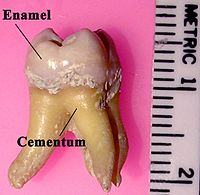
Photo from wikipedia
Background/purpose Dental unit water lines (DUWLs) may be contaminated by aerobic bacteria in clinical settings and comprehensive disinfecting methods should be considered without delay. Herein, this study aims to investigate… Click to show full abstract
Background/purpose Dental unit water lines (DUWLs) may be contaminated by aerobic bacteria in clinical settings and comprehensive disinfecting methods should be considered without delay. Herein, this study aims to investigate the timeliness and dynamic bacteriostatic effects of different forms of nanometer silver (NMS) disinfectant on bio-film in DUWLs. Materials and methods Bacterial DUWLs samples were respectively treated with different NMS forms, including liquid phase and solid phase at the concentrations of 0.25%, 0.5%, 1% and 2% and their bacteriostatic effects were observed at the 1st, 4th, 7th, 14th, 28th day. Results The bacteriostatic effects of liquid phase NMS at all concentrations were unsatisfactory and the bacteriostatic rate was only 20% at the 1st day. However, there appeared massive bacteria growth at the 4th, 7th, 14th, 28th day. Comparatively, no bacteria growth was found at the 1st, 4th, 7th, 14th, 28th day after sterilizing with different concentrations of solid phase NMS and the bacteriostatic rate was 100%. Conclusion Microbial contamination in DUWLs can be disinfected by different NMS forms, among which solid phase NMS is more bactericidal against bacteria bio-films, demonstrating significant roles of solid phase NMS in preventing DUWL contamination.
Journal Title: Journal of Dental Sciences
Year Published: 2021
Link to full text (if available)
Share on Social Media: Sign Up to like & get
recommendations!